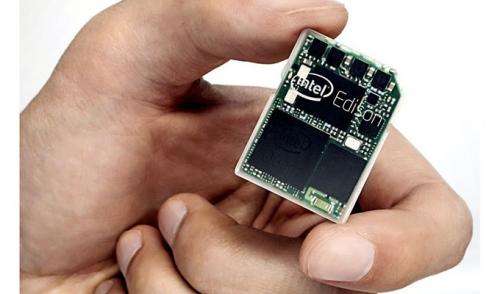April 2, 2014 weblog
Intel makes new moves on Edison: Atom yes, Quark no

(Phys.org) —Last month's Intel blog post by an Intel VP, Michael Bell, announced the latest enhancements for Edison, the company's platform with built-in wireless, targeted for builders of small form factor devices and wearables. Intel decided that "in order to best address a broader range of market segments and customer needs we will extend Intel Edison to a family of development boards." Notable enhancements, said Bell, who is general manager of the New Devices Group at Intel, include use of the 22nm Silvermont dual core Intel Atom SOC; increased I/O capabilities and software support; and a simplified industrial design. Intel said a priority was "bringing the board powered by the 22nm Silvermont dual core Intel Atom SOC to market first" to best answer market needs.
"Offering a dual core, dual threaded CPU at 500MHz with an additional MCU and over 30 I/O interfaces via a small 70-pin connector the product will offer solid performance for wearable or small form factor device creators."
Elaborating on enhanced support, Bell said Edison will be compatible with developer tools used by the maker community, such as the Arduino IDE and Wolfram Language. He also mentioned plans to add support for Yocto Linux, Node.js and Python. Edison will continue to be connected with Wi-Fi and Bluetooth LE support.
The last point about industrial design involved news that the design will be "slightly larger" than an SD card. This stepping away from the SD card form factor especially captured the attention of headlines writers, as Engadget's Monday headline read "Intel's SD card-sized computer may not be so tiny after all." Intel had shown the Edison PC at CES in January, talking about the form factor of an SD card powered by Quark. "Intel is moving the goalposts," said Barry Collins in PCPro. "Quark has been substituted for a 22nm Atom processor, Collins explained that "Bringing in the heftier processor appears to have scuppered Intel's plans to deliver the PC in a memory card-sized format, with Bell now claiming the device will be 'slightly larger than an SD card'".
Intel's Bell stated the reasons: "Intel Edison will provide more value for our customers by simplifying the design process for the companies creating the designs, increasing the durability and providing additional cost savings in comparison to building for an SD form factor."
Collins said "a small bump in size" would likely make "no substantive difference to Edison's potential applications in the wearables market."
Intel Edison is to be available this summer.
Ina Fried of Re/code put the Edison blog announcement in the bigger picture: Intel is trying to speed up its effort to find a place in ever-smaller computers, she wrote. "Intel showed off Project Edison back at CES and since then the company has been working to both refine the product and connect with projects interested in using the tiny computer."
More information: blogs.intel.com/technology/201 … e-expanded-benefits/
© 2014 Phys.org





















